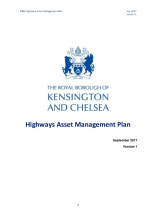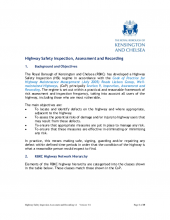Maintaining roads and pavements
Highways maintenance
Our standard of highways maintenance and street lighting are amongst the highest in the country. We:
- are strict about licensing works on the highway
- require Construction Traffic Management Plans to ensure there is minimum disruption to residents
- expect contractors to leave our roads and pavements in the condition they found them.
If you would like to report a problem on our streets please contact Streetline on 020 7361 3001 or email [email protected].
Inspections and annual programme
We inspect:
- principal roads and heavily used pavements monthly
- minor roads every 6 months
Our inspectors record the condition of the pavement, carriageway, and street furniture and look for any other potential hazard to road users. We make urgent repairs within 2 or 24 hours depending on the severity.
We have comprehensive annual programmes of pavement improvements. The programme is developed following condition surveys to make sure any defects are fixed where necessary.
We carry out all works in accordance with our streetscape principles and use high quality materials and workmanship. We also remove unnecessary street clutter.
Additional government funding for highway maintenance in Kensington and Chelsea
The Department for Transport (DfT) announced in December 2023, that London would receive £235 million of additional funding over an 11-year period for highways maintenance funding, made possible by reallocated High Speed Two (HS2) funding. Kensington and Chelsea’s share of the grant for the years 2023 to 2024 and 2024 to 2025 is £101,000. The total grant is £3.156 million over the 11-year period.
A requirement of the DfT funding is that councils must produce a plan that places the additional maintenance investment into context. This plan is provided below.
Every year the Council resurfaces between 50 and 80 roads in the borough as part of its normal programme of work. Most of the budget for highway maintenance is used for programmed work with a small amount spent on reactive work, making the best use of our resources. The government grant mentioned above will be added to our annual programme so that we can bring more of our roads up to the standard that road users expect. Specifically, these will include sections of Albert Bridge and Kensington Road.

How we are introducing innovation in the management of our assets
The Royal Borough has a strong heritage of design standards through our streetscape policy has implemented many innovative projects such as Exhibition Road and Kensington High Street. We regard high standards of maintenance as critical to ensuring the long-term success of such schemes. We work closely with our term maintenance contractors to help develop and implement innovations in materials and construction techniques from modified polymer binders in surfacing materials to reduce rutting at bus stops, through to recycling over 98% of the construction waste from schemes.
We are investigating new ways to manage and assess the condition of our highway through AI, continuing to roll out new low energy street lighting infrastructure, and have a programme to manage and maintain our structures which includes Albert (Grade II*) and Chelsea (Grade II) bridges. Albert Bridge, opened in 1873, was completely refurbished and strengthened in 2012 to still accommodate light vehicular traffic through innovative construction and design. As noted above, we will be carrying out additional resurfacing this year and we have begun using enforcement cameras to discourage drivers of overweight vehicles putting undue pressure on the bridge.
The Council has an annual planned and reactive maintenance programme. Our goal is to conduct the most effective planned maintenance to minimize the necessity for more costly reactive repairs. The ongoing planned preventative maintenance strategy optimizes the use of our resources to sustain our roads at the lowest "whole life" cost. Any short-term savings might result in higher maintenance costs in the future.
How we manage utility works
The Royal Borough uses its powers under Section 58 of the New Roads and Street Works Act 1991 to ensure that when we resurface roads, these roads are not then excavated for utility works soon after. Our Network Management team engages early with utility companies to ensure any planned known work within the proposed area of resurfacing is carried out in advance of resurfacing work. This is achieved through creating and issuing formal proposed 3-month Section 59 restriction notices via Street Manager, regular agenda items at quarterly co-ordination meetings, publishing S58 notices on the Council’s website and individual work programme meetings.
The Council robustly enforces the restriction period and refuses permit applications that are submitted in areas where resurfacing has been carried out. Exempt street works such as emergency, urgent and customer connections are closely scrutinised and validated by the Network Management team which often includes requests to see additional evidence from utilities regarding the nature of the work and/or the date of when customer connection works were first received by the utility company.
The Council is extremely proactive in arranging collaborative working opportunities with different stakeholders to avoid repeated digging up of the same road. Over the last 3 years the Network Management team have saved the equivalent of 1,065 days of additional days of disruption to our road network through these initiatives.
The Council publishes its annual highways planned maintenance programme through a Key Decision and this can be found on the Decisions and Forward Plan pages.
Our recent expenditure on maintenance of all local highways
The DfT has requested the Council to provide the total amount of capital investment in the maintenance of local highway networks for the most recent 5 years and planned capital investment for 2024 to 2025.
| Year |
Total DfT capital grant funding
|
Total amount of capital investment in the maintenance of local highway networks (including both council and DfT grant funding streams (£'000s) |
Total amounts of revenue spend on the maintenance of local highway networks (£ millions) |
|---|---|---|---|
| 2019-2020 | £0 | £0 | £5.5 million |
| 2020-2021 | £0 | £0 | £5.5 million |
| 2021-2022 | £0 | £0 | £5.5 million |
| 2022-2023 | £0 | £0 | £5.53 million |
| 2023- 2024 | £101,000 | £101,000 | £5.6 million |
| 2024-2025 | £101,000 | £721,000 | £6.2 million* |
*Subject to approval of a Key Decision. See Decisions and the Forward Plan for more information.
Useful links
Last updated: 14 March 2024


